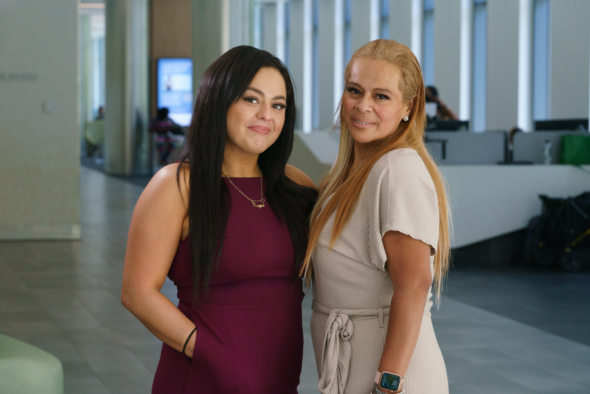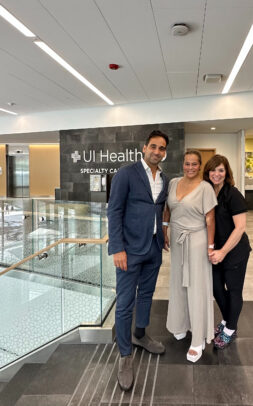Daughter to mom who needed transplant at UI Health: ‘Don’t worry. I got your back’

Raquel Ramirez shares her name with her daughter, so it was only fitting that one day her daughter would share a part of herself back with her mom.
When Ramirez got sick in 2021 and needed a liver transplant, her daughter, Raquel Regalado, who goes by Rocky, did not hesitate to be a living donor.
“They basically said, you’re in need of a transplant. We’re going to put you on the waiting list, but somebody can be a living donor,” Ramirez said. “She told me to my face: Don’t worry, Mom. I got your back.”
In fact, both Regalado and her identical twin sister, Kristen, were matches to be liver donors for their mom. “I was going to do it regardless,” Regalado said, “but we wanted to see who was a better match.”
The twins decided that whoever was not the donor was going to be the main support person — organizing doctors’ appointments, informing family and taking on the managerial role.
While the donor aspect may have seemed predetermined, getting there was its own unique journey.
Ramirez previously had worked in the medical field, so she was steadfast about her annual doctor visits and having lab work done. She was aware that her liver enzymes were always a little bit high, but it was not at the point that she needed medication. So, when she got sick, it came as a shock.
In April 2021, she suddenly began having gastrointestinal issues. She went to the hospital, where they performed an MRI and took a biopsy of her liver, which showed she had primary biliary cirrhosis due to non-alcoholic fatty liver disease. It was advanced — Stage 4 — but the doctor told her they could manage her condition with medication.
However, managing the medication was difficult with her job. Her medicine made her use the restroom more frequently, and as a lineman apprentice with IBEW Local 9 Electricians, she had long days in the field with infrequent restroom access.
By the fall, she was getting very sick, with bloating and difficulty walking.
“I had three hospital visits — back and forth between two hospitals — and each time, they just sent me back home,” she said.
Ramirez continued to work. Eventually, the illness became so severe that she called an ambulance. During this visit, they discovered a blood clot in her leg, and she had 16 liters of fluid removed. Based on her condition, she was given a prognosis of just a few months. It was at this point that she was referred to UI Health, the academic health enterprise of the University of Illinois Chicago.
“They came in like angels out of heaven! The UI Health doctors said, ‘We’re going to take care of you!’” Ramirez said.
Once Ramirez arrived at UI Health, she met with transplant surgeon Dr. Mario Spaggiari, UIC assistant professor of surgery at the College of Medicine.
“The way he spoke to me and my daughters was so calming,” she said. “I felt his calmness and his warmth, and I knew I was in the right place. We were going to make it through this process.”

Spaggiari told Ramirez and her daughters to focus on her health and stay aware of her MELD score, which indicates the severity of disease. Her MELD score wasn’t at the level that required an imminent transplant — she was on the deceased donor waiting list — but she was a great candidate for a living-donor transplant. Her daughters insisted they begin moving forward with this option.
With Regalado as a match, they had an initial transplant date in December 2022, which also worked well with Regalado’s winter break from nursing school. However, when they went in for surgery, Regalado tested positive for COVID-19, so it was rescheduled for March. In the meantime, Ramirez was continuing paracentesis (fluid drainage) — three times a week, then down to two, then back up to three.
“I was really, really sick — I really felt miserable and thought that I might die. I was very tired. It was hard to move. I could barely walk,” she said.
Said Regalado: “During the process, and when it was getting close to the actual procedure, it started becoming harder and harder. It was getting more stressful because we were trying to get everything organized on our standpoint: How our households are going to be OK. How my twin sister is going to be able to help. The money side of it, the time part of it to take off school. Getting everything organized. During that time, it was very stressful.
“We were sad and stressed out. We had so much work to do on our end, but I feel like the way that Lisa was organizing everything was so helpful,” Regalado said.
That’s Lisa Mariano, the transplant clinical coordinator in the Liver Transplant Program, who shepherds patients and families through the many pre- and post-transplant appointments and helps facilitate other support services.
“She was a big plus getting everything organized. She set the dates for us, reminded us of appointments, and she would text us and give us updates. No matter what time it was, she would respond to us and answer our questions,” Ramirez said. “If she needed to get us in, she’d set us up. She made it work for us.”
Additionally, Mariano coordinated with a donor-specific program that assisted with costs related to appointment travel for Regalado throughout the process and nearby lodging after surgery. They also helped with caregiver travel for Ramirez’s other daughter, Samantha, who lives in California.
Ramirez and Regalado went in for the transplant surgery in March 2023. Regalado recovered and went home in about a week and a half. Ramirez stayed in the hospital for about a month; she had a continual fever, so her transplant team wanted to ensure she was not a risk for complications before transferring her to occupational/physical therapy.
Today, Ramirez is doing great. Her follow-ups are down to just once a month, and she’s back doing light exercise in the gym and going for walks.
“When I see family, friends, and neighbors, they say, ‘Oh my God, you look like a living miracle!’” she said. “My and my daughters’ faith in God brought us through this life-changing process — and my wonderful transplant team at UI Health.”
